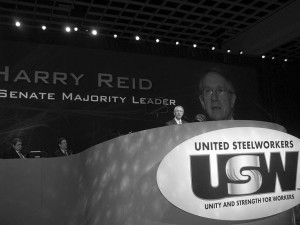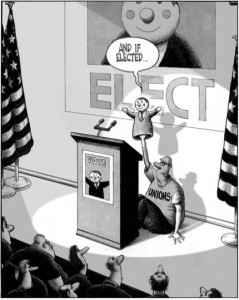Is This Any Way to Run a City’s Schools?
Leaked CTU Proposals Won’t Do Anything to Improve Schools’ Poor Performance

Survey Results in, Committee Members Put Heat on the Candidates
(Source: October 2010 NRTWC Newsletter)
With the results of the National Right to Work Committee’s federal Survey 2010 now in, Committee members from coast to coast keep turning up the heat on U.S. Senate and House candidates to publicly pledge 100% support for the Right to Work.
Committee members and supporters who receive the Newsletter through the U.S. Postal Service can find out whether and how their candidates responded to the Right to Work survey by consulting the Survey 2010 results roster enclosed with this month’s issue.
Pro-Right to Work Americans who have not yet received their Survey 2010 results may obtain a copy by contacting the Committee by e-mail — Members@NRTW.org — or by dialing 1-800-325-7892.
By calling, writing, and visiting their candidates and urging them to declare themselves in opposition to forced unionism, Committee members are making forced unionism and the Right to Work red-hot issues in state after state this year.
Right to Work Activity Key to Stopping Big Labor
At this writing, just a few weeks remain until Election Day.
And reports from a wide array of pollsters and pundits indicate that the caucus of politicians who support Big Labor’s agenda on forced-unionism issues such as federally-mandated “card checks” will shrink significantly after voters go to the polls.

Consequently, union lobbyists may be hard-pressed in 2011 and 2012 to ram through legislation expanding union bosses’ coercive privileges over independent-minded private-sector employees and small businesses.
However, pro-forced unionism President Barack Obama will retain the power, for at least the next two years, to promote forced unionism by issuing executive orders and by appointing Big Labor shills to powerful federal agencies such as the National Labor Relations Board (NLRB).
Congress has the constitutional authority to thwart the President from unilaterally giving away the store, but doing so requires a strong commitment to principal on the part of senators and representatives.
Moreover, passage of Big Labor legislative schemes that do not blatantly attack private businesses and employees, including the AFL-CIO-backed Police/Fire Monopoly-Bargaining Bill, is likely to remain a grave threat in the 2011-2012 Congress regardless of the 2010 election results.
“Election results that are merely unfavorable for Barack Obama’s Democratic Party won’t nearly suffice to turn back the tide of forced unionism now that the President has already put Big Labor cheerleaders in charge of key agencies like the NLRB,” observed Committee President Mark Mix.
“And since several key legislative union power grabs such as the Police/Fire Monopoly-Bargaining Bill are backed by a significant number of GOP politicians as well as virtually all Democrat politicians, Right to Work supporters won’t be able to let their guard down on the legislative front, either.
“Whatever happens on November 2, Right to Work activity will remain critical for stopping Big Labor.”
Several Big Labor Senators Face Strong Challenges
This fall, Right to Work supporters hoping to enhance their ability to fight forced unionism over the next couple of years have multiple opportunities in U.S. Senate contests.
Just to start with, five current senators with pro-forced unionism records are, according to the latest polls, either trailing or running neck-and-neck in their re-election campaigns against 100% pro-Right to Work challengers.
Big Labor Arkansas Democrat Blanche Lincoln is in the worst shape of all. Sen. Lincoln, who is seeking a third term, has a long track record of backing union special-interest legislation.
For example, in 2007 she voted to quash a Right to Work filibuster and help Big Labor ram through its notorious “Card-Check” Forced-Unionism Bill. And in the current Congress, she is a cosponsor of the Police/Fire Monopoly-Bargaining Bill.
Realizing too late that her history of subservience to Big Labor could kill her 2010 re-election hopes, Ms. Lincoln has tried to backpedal from her past votes for the “card-check” measure and other employee-coercing, economy-crushing schemes.
But freedom-loving Arkansans apparently aren’t fooled by the senator’s half-hearted gestures. Recent surveys indicate she is running well behind her GOP challenger, staunchly pro-Right to Work Congressman John Boozman.
Two other union-label senators, 2009 appointee Michael Bennet (D-Colo.) and three-term incumbent Russ Feingold (D-Wisc.), are also trailing their unabashedly pro-Right to Work challengers, Republicans Ken Buck (Colo.) and Ron Johnson (Wisc.), in recent polls, but by relatively small margins.
Yet another two union-boss lackey Democrats, Majority Leader Harry Reid of Nevada and Patty Murray of Washington State, are statistically tied up with the across-the-board Right to Work supporters who are aiming to unseat them, Sharron Angle (R-Nev.) and Dino Rossi (R-Wash.)
Several ‘Open’ Seat Gains Likely or Possible For Right to Work Adherents
The number of Right to Work opportunities is even greater when it comes to “open” seats that have up to now been under union lobbyists’ control.
100% pro-Right to Work candidates are now narrowly leading in contests for “open” Senate seats now held by Big Labor water carriers in Indiana, Pennsylvania, and West Virginia.
The candidates who are standing up to the union bosses are former U.S. Sen. Dan Coats (Ind.), former Congressman Pat Toomey (Pa.), and John Raese (W.Va.). Their Big Labor-backed Democrat rivals are Reps. Brad Ellsworth (Ind.) and Joe Sestak (Pa.) and Gov. Joe Manchin (W.Va.).
Candidates who are vowing to support the Right to Work on all votes are also leading in races for two “open” seats that have been held by Republicans who only sporadically opposed union power grabs.
In Alaska, union boss-appeasing Republican Lisa Murkowski, a cosponsor of the Police/Fire Monopoly-Bargaining Bill, was defeated in her primary contest this summer by forced-unionism foe Joe Miller.
Mr. Miller now leads both Big Labor favorite Scott McAdams (D) and Ms. Murkowski, who is running a long-shot general election campaign as a write-in candidate.
In Florida, former GOP Sen. Mel Martinez, who resigned last August, was another pro-union monopoly Republican. But the Republican nominee for the “open” seat, Marco Rubio, pledges full support for Right to Work.
Polls show Mr. Rubio leading over union-label “Independent” Gov. Charlie Crist and Democrat Kendrick Meek. (Mr. Meek is currently a congressman.)
Finally, in one race for an “open” Senate seat now held by an anti-Right to Work Democratic politician, the pro-freedom candidate is currently trailing, but within striking distance.
Delaware GOP nominee Christine O’Donnell, a staunch Right to Work advocate, is fighting to catch up with Big Labor pet Chris Coons (D).
The National Right to Work Committee and its members (now 2.6 million, and growing) are determined to ensure that congressmen and senators who have carried water for Big Labor time and again are held accountable this fall.
Committee Rallies Members To Put Heat on CandidatesThe principal Committee program for holding politicians’ feet to the fire is the federal candidate Survey 2010.
The ongoing Survey 2010 consists of three phases.
In the first phase, candidates received questionnaires asking them how they intended to vote on a number of forced unionism-related issues, including mandatory “card checks,” federalized public-safety union monopoly bargaining, and national Right to Work legislation.
“The Committee’s goal is not just to secure enough support to block enactment of forced-unionism schemes like ‘card check’ legislation, but also to forge pro-Right to Work majorities in the Senate and House,” explained Committee President Mix.
“That’s why the Right to Work survey raises the pressure on candidates to oppose the expansion of Big Labor’s forced-unionism privileges, and also to support rolling those privileges back.”
In the second phase of the Survey 2010, Committee members called and wrote the candidates, asking them to answer their questionnaires 100% in favor of Right to Work.
In the final phase, the Committee, through TV and newspaper ads, e-mails and the postal service, is reporting back to members and friends at the local level on how their candidates responded. That keeps the heat on non-responsive candidates until Election Day to take a clear stand on the Right to Work issue.
“The aim of Big Labor’s billion-dollar, forced dues-funded electioneering program is to divert public attention from the damage that union-label politicians have wrought on America over the past two years and the even more severe damage they will do over the next two years if they can,” said Mr. Mix.
Public Doesn’t Support Compulsory Unionism
“Big Labor has far more money at its disposal than do Right to Work supporters, but the union bosses have one major problem: The general public, and even the workers they claim to represent, don’t support what they are selling,” Mr. Mix continued.
“Poll after poll shows that nearly 80% of Americans agree that no one should be forced to join or pay dues to a union, simply in order to keep his or her job.
“The Committee survey program works simply by ensuring that the Right to Work issue, which already has overwhelming public support, remains in the spotlight throughout the campaign season.
“With members’ generous support, I’m confident that this fall the federal survey will force candidate after candidate either to pledge to stop attacking employees’ Right to Work, or face serious repercussions at the polls.”


Leaked CTU Proposals Won’t Do Anything to Improve Schools’ Poor Performance

Wherever Big Labor wields the power to collect forced union dues, union bosses funnel a large share of the confiscated money into efforts to elect and reelect business-bashing politicians. Employment growth tends to lag as a consequence.

Members Insist They Keep Pro-Right to Work Campaign Promises